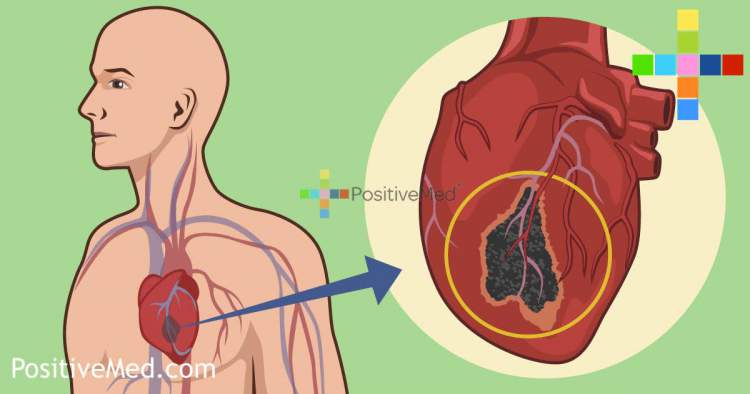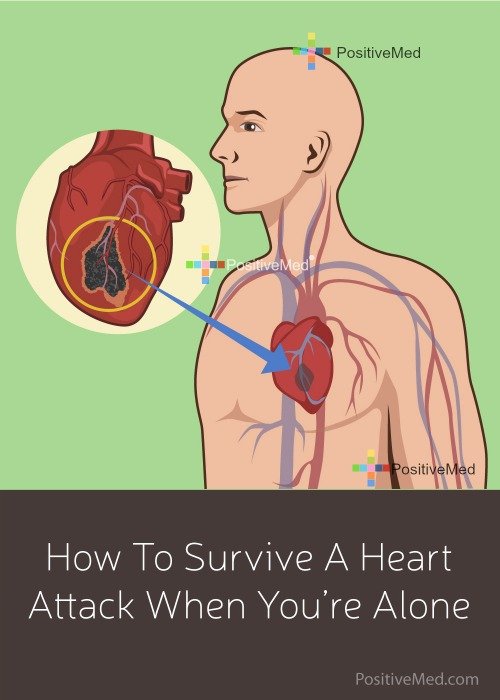How To Survive A Heart Attack When You’re Alone
SPANISH TRANSLATION: CÓMO SOBREVIVIR A UN ATAQUE AL CORAZÓN CUANDO ESTÁS SOLO
Heart attacks and other forms of heart disease affect thousands of people each day. With prompt medical treatment, it is possible to survive a heart attack when you’re alone. If you are alone when you recognize that you are having a heart attack, the right actions can greatly increase your recovery, and it is possible to greatly lower your risk of having a heart attack in the first place.

What Are the Symptoms of a Heart Attack?
It is important to know the symptoms of having a heart attack, so you know what to look for if you began to feel unwell. Signs of a heart attack may include:
- intense chest pain
- pain in the left upper arm, jaw, or neck
- chest pain lasting at least 20 minutes
- extreme sweating
- feelings of doom
- nausea or vomiting
- shortness of breath
- the feeling of pressure on the chest
Although rare, there may come a time in your life when you experience a life-threatening event. The more you know about what is happening to your body the better chance you have of saving yourself and knowing when to put yourself into the hands of a medical team. This article defines three major life threatening events, gives you their symptoms and suggests what to do in each situation ===> THIS May Save Your Life: The Difference Between A Heart Attack, Stroke And Cardiac Arrest
What Should You Do When a Heart Attack Happens?
The first thing you should do if you recognize symptoms of a heart attack is to call for emergency medical help. If you have access to aspirin, taking a normal dosage can be one of the best ways to improve chances of survival because aspirin prevents dangerous blood clots from getting larger. While you wait for the EMS team to arrive, write down emergency contact information and information about any other medical conditions you are already being treated for.
What Should You Not Do if Having a Heart Attack Alone?
Though nitroglycerin is often prescribed for heart conditions such as angina, it is not helpful during a heart attack. Rhythmically coughing or putting pressure on your chest are also other remedies that will not help in any way. Without any medical supervision, the above rumored treatments can actually increase your risk of unpleasant complications.
RELATED ARTICLE: 9 Natural Ways To Reduce Risk of Blood Clots
How Can You Lower Your Risk of a Heart Attack?
Regular physical exercise, lowered cholesterol, and a diet high in grains and low in fats can all help to lower your risk of a heart attack. This natural tea can help to lower your risk for heart attacks by lowering your blood sugar, promoting muscle health, and lowering your weight.
Ingredients
- 1 Green Tea Bag
- ⅓ Inch Piece of Ginger
- 1 Small Pinch of Fenugreek
- Honey to Taste
Most women associate having a heart attack, or myocardial infarction (MI), with symptoms that come on suddenly and without warning. On the contrary, subtle clues to an impending cardiac event can show up nearly a month before an actual heart attack. Most MIs are caused by an occlusion of a coronary artery that results from a gradual build-up of plaque that eventually cuts off the blood supply. The pain and crushing pressure of a heart attack is felt when blood flow is stopped to a portion of the heart muscle that results in tissue death ===> Signs & Symptoms That You Could Have a Heart Attack Next Month
Instructions
Bring 2 cups of water to boil with the finely chopped ginger, and ground fenugreek.
Once the water is boiling, remove it from heat and add the tea bag.
Let the tea steep for 15 minutes.
Sweeten with honey and drink when it is cool.
Though the idea of having a heart attack while alone may be scary, it is possible to survive it. Staying calm, calling for an ambulance, and taking an aspirin will greatly benefit you if you have a heart attack. However, with the right preventative treatment, you can greatly reduce your risk of having a heart attack, so you can worry less.
Pin It!







